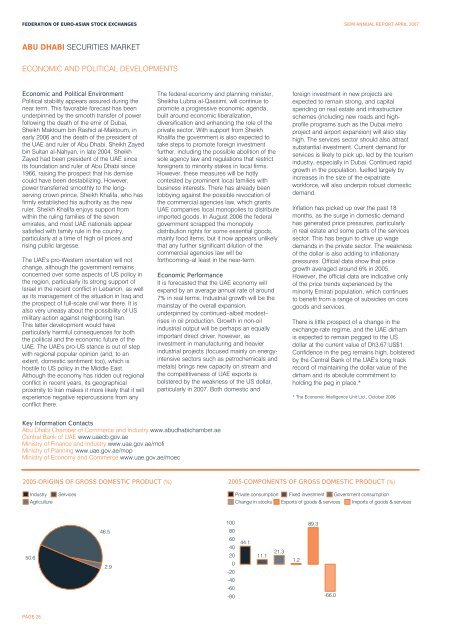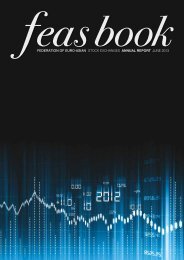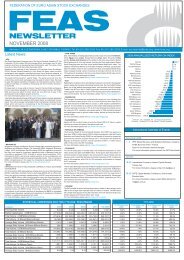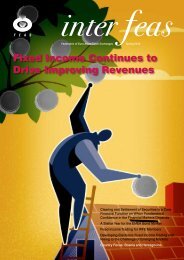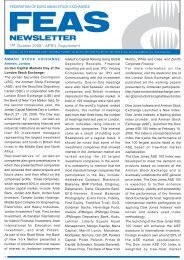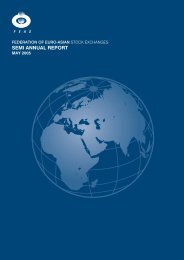Download - FEAS
Download - FEAS
Download - FEAS
Create successful ePaper yourself
Turn your PDF publications into a flip-book with our unique Google optimized e-Paper software.
FEDERATION OF EURO-ASIAN STOCK EXCHANGES SEMI ANNUAL REPORT APRIL 2007<br />
ABU DHABI SECURITIES MARKET<br />
ECONOMIC AND POLITICAL DEVELOPMENTS<br />
Economic and Political Environment<br />
Political stability appears assured during the<br />
near term. This favorable forecast has been<br />
underpinned by the smooth transfer of power<br />
following the death of the emir of Dubai,<br />
Sheikh Maktoum bin Rashid al-Maktoum, in<br />
early 2006 and the death of the president of<br />
the UAE and ruler of Abu Dhabi, Sheikh Zayed<br />
bin Sultan al-Nahyan, in late 2004. Sheikh<br />
Zayed had been president of the UAE since<br />
its foundation and ruler of Abu Dhabi since<br />
1966, raising the prospect that his demise<br />
could have been destabilizing. However,<br />
power transferred smoothly to the longserving<br />
crown prince, Sheikh Khalifa, who has<br />
firmly established his authority as the new<br />
ruler. Sheikh Khalifa enjoys support from<br />
within the ruling families of the seven<br />
emirates, and most UAE nationals appear<br />
satisfied with family rule in the country,<br />
particularly at a time of high oil prices and<br />
rising public largesse.<br />
The UAE's pro-Western orientation will not<br />
change, although the government remains<br />
concerned over some aspects of US policy in<br />
the region, particularly its strong support of<br />
Israel in the recent conflict in Lebanon, as well<br />
as its management of the situation in Iraq and<br />
the prospect of full-scale civil war there. It is<br />
also very uneasy about the possibility of US<br />
military action against neighboring Iran.<br />
This latter development would have<br />
particularly harmful consequences for both<br />
the political and the economic future of the<br />
UAE. The UAE's pro-US stance is out of step<br />
with regional popular opinion (and, to an<br />
extent, domestic sentiment too), which is<br />
hostile to US policy in the Middle East.<br />
Although the economy has ridden out regional<br />
conflict in recent years, its geographical<br />
proximity to Iran makes it more likely that it will<br />
experience negative repercussions from any<br />
conflict there.<br />
The federal economy and planning minister,<br />
Sheikha Lubna al-Qassimi, will continue to<br />
promote a progressive economic agenda,<br />
built around economic liberalization,<br />
diversification and enhancing the role of the<br />
private sector. With support from Sheikh<br />
Khalifa the government is also expected to<br />
take steps to promote foreign investment<br />
further, including the possible abolition of the<br />
sole agency law and regulations that restrict<br />
foreigners to minority stakes in local firms.<br />
However, these measures will be hotly<br />
contested by prominent local families with<br />
business interests. There has already been<br />
lobbying against the possible revocation of<br />
the commercial agencies law, which grants<br />
UAE companies local monopolies to distribute<br />
imported goods. In August 2006 the federal<br />
government scrapped the monopoly<br />
distribution rights for some essential goods,<br />
mainly food items, but it now appears unlikely<br />
that any further significant dilution of the<br />
commercial agencies law will be<br />
forthcoming–at least in the near-term.<br />
Economic Performance<br />
It is forecasted that the UAE economy will<br />
expand by an average annual rate of around<br />
7% in real terms. Industrial growth will be the<br />
mainstay of the overall expansion,<br />
underpinned by continued–albeit modest–<br />
rises in oil production. Growth in non-oil<br />
industrial output will be perhaps an equally<br />
important direct driver, however, as<br />
investment in manufacturing and heavier<br />
industrial projects (focused mainly on energyintensive<br />
sectors such as petrochemicals and<br />
metals) brings new capacity on stream and<br />
the competitiveness of UAE exports is<br />
bolstered by the weakness of the US dollar,<br />
particularly in 2007. Both domestic and<br />
foreign investment in new projects are<br />
expected to remain strong, and capital<br />
spending on real estate and infrastructure<br />
schemes (including new roads and highprofile<br />
programs such as the Dubai metro<br />
project and airport expansion) will also stay<br />
high. The services sector should also attract<br />
substantial investment. Current demand for<br />
services is likely to pick up, led by the tourism<br />
industry, especially in Dubai. Continued rapid<br />
growth in the population, fuelled largely by<br />
increases in the size of the expatriate<br />
workforce, will also underpin robust domestic<br />
demand.<br />
Inflation has picked up over the past 18<br />
months, as the surge in domestic demand<br />
has generated price pressures, particularly<br />
in real estate and some parts of the services<br />
sector. This has begun to drive up wage<br />
demands in the private sector. The weakness<br />
of the dollar is also adding to inflationary<br />
pressures. Official data show that price<br />
growth averaged around 6% in 2005.<br />
However, the official data are indicative only<br />
of the price trends experienced by the<br />
minority Emirati population, which continues<br />
to benefit from a range of subsidies on core<br />
goods and services.<br />
There is little prospect of a change in the<br />
exchange-rate regime, and the UAE dirham<br />
is expected to remain pegged to the US<br />
dollar at the current value of Dh3.67:US$1.<br />
Confidence in the peg remains high, bolstered<br />
by the Central Bank of the UAE's long track<br />
record of maintaining the dollar value of the<br />
dirham and its absolute commitment to<br />
holding the peg in place.*<br />
* The Economic Intelligence Unit Ltd., October 2006<br />
Key Information Contacts<br />
Abu Dhabi Chamber of Commerce and Industry www.abudhabichamber.ae<br />
Central Bank of UAE www.uaecb.gov.ae<br />
Ministry of Finance and Industry www.uae.gov.ae/mofi<br />
Ministry of Planning www.uae.gov.ae/mop<br />
Ministry of Economy and Commerce www.uae.gov.ae/moec<br />
2005-ORIGINS OF GROSS DOMESTIC PRODUCT (%)<br />
2005-COMPONENTS OF GROSS DOMESTIC PRODUCT (%)<br />
Industry<br />
Agriculture<br />
Services<br />
Private consumption Fixed investment Government consumption<br />
Change in stocks Exports of goods & services Imports of goods & services<br />
50.6<br />
46.5<br />
2.9<br />
100<br />
80<br />
60<br />
40<br />
20<br />
0<br />
-20<br />
44.1<br />
11.1<br />
21.3<br />
1.2<br />
89.3<br />
-40<br />
-60<br />
-80<br />
-66.0<br />
PAGE 26


